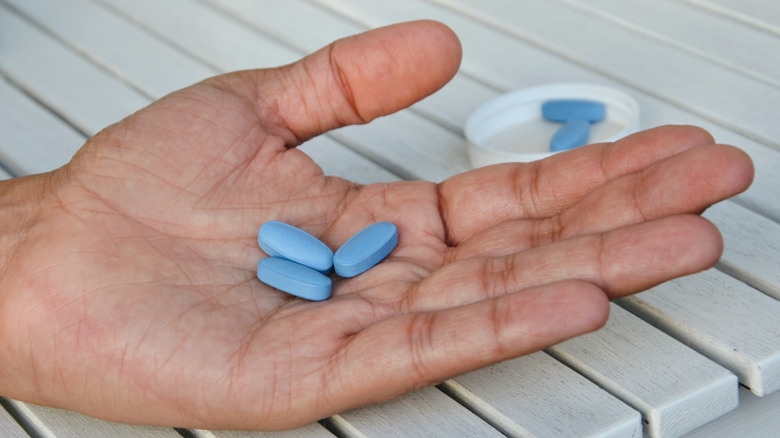What Happens To Your Brain When You Take Too Much Viagra
Viagra (sildenafil) treats erectile dysfunction (ED) by relaxing the walls of your blood vessels to improve blood flow. It was originally designed to treat high blood pressure, but researchers noticed that erections were a side effect (read how high blood pressure and ED are linked). Because there wasn't a drug on the market to treat ED, the U.S. Food & Drug Administration quickly approved Viagra in 1998.
Like many drugs, Viagra has side effects. These include nasal congestion, heartburn, and flushing, according to a 2000 study in Urology. About 25% of people experience headaches, especially if they take higher doses of the drug. Viagra is a phosphodiesterase-5 (PDE5) inhibitor, as are Levitra, Cialis, and Stendra. PDE5 is an enzyme that affects your blood flow and signaling of your cells, which is why PDE5 inhibitors are also prescribed for angina, high altitude sickness, and lower urinary tract symptoms associated with an enlarged prostate.
Researchers still aren't sure why Viagra causes headaches, but they believe it might have something to do with how the drug affects blood vessels in the brain. If you experience a headache while taking Viagra, you have a few options.
Headache relief while taking Viagra
One way to avoid a Viagra headache is to talk to your doctor about switching your ED medication or lowering your dose. A 2014 case study in the Canadian Urological Association Journal highlighted the account of a 62-year-old man who had taken medication to control his cluster headaches. When he took 50 milligrams of Viagra, he experienced an intense cluster headache 30 minutes later. The next day, he developed another headache after taking Viagra. To alleviate his headache, his doctors told him to take naproxen every day. He was also prescribed a 5-milligram dose of Levitra (vardenafil) to treat his ED.
You can safely take pain medication such as naproxen, acetaminophen, or ibuprofen while you're on Viagra. But, be aware that taking pain medications too often can cause more headaches. Also, taking too much ibuprofen can cause side effects like constipation, diarrhea, or indigestion. Ibuprofen and other nonsteroidal anti-inflammatory drugs (NSAIDs) can also interact with antidepressants, beta-blockers, or other medications.
Don't use Viagra if you don't need it
The National Institute of Diabetes and Digestive and Kidney Diseases says more than 30 million men in the United States have ED. However, some people believe Viagra will improve their sex life if they don't have ED, so they may try to purchase it without a prescription. If you buy Viagra from a questionable pharmacy, there's no guarantee how much of the drug you'll be getting. There might also be contamination in the pills. According to GoodRx, Viagra and other ED medications are the most commonly counterfeited drugs.
Recreational use of Viagra might boost your sexual confidence, but it might also affect you later. According to a 2012 study in the Journal of Sexual Medicine, men without ED who took Viagra recreationally had less confidence in their natural erectile ability. They also weren't as satisfied with their sexual performance. Not only that, but the more men used ED medications, the more they believed they needed them to get an erection.
You're also more likely to experience a Viagra headache if you're taking the drug off-label or recreationally. Because Viagra and other ED medications lower your blood pressure, it could become dangerously low if you're already on blood pressure medication or taking nitrates.


